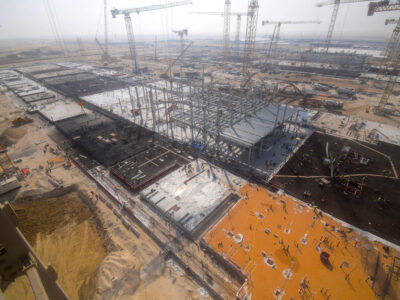Major port developments in the Gulf region are likely to lead to tensions between countries as they battle to become the region’s top trading hub, Business Monitor International has said.
Analysts said that although port expansion projects are planned in Kuwait, Qatar, Saudi Arabia and Iraq, demand is insufficient to accommodate them all.
It said relations between Kuwait and Iraq were currently strained because of Kuwaiti plans to build the $1.1bn Mubarak al-Kabir port, close to the Iraqi border.
The foundation stone for the new Kuwaiti port of Mubarak al-Kabir was laid this month, but BMI analysts said that the port’s success is likely to rely on thwarting Iraqi ambitions to claim the same business.
“BMI is unsurprised that port developments in the Gulf region are beginning to lead to disputes between countries,” analysts said in a new report.
Following the lead set by Dubai’s Jebel Ali port, BMI said every country in the region now has eyes on creating a similar transhipment hub, with developments and expansions planned not only in Kuwait and Iraq, but also Qatar (New Doha Port) and Saudi Arabia (Dammam).
“The problem is that even with the Gulf populations’ consumption rising, (and likely to continue to do so over the mid term on the back of elevated oil and gas prices) the demand is not great enough to accommodate all the planned port developments,” the BMI report said.
BMI said this has already been demonstrated by Bahrain’s new Khalifa bin Salman port, which it said “has struggled to attract transhipment custom and is currently operating well below capacity”.
Kuwait’s new port is to be situated on Bubiyan Island, close to the Iraqi port of Umm Qasr.
It is expected that by 2015 Mubarak al-Kabir will have an annual handling capacity of 1.8m 20ft equivalent units (TEUs).
“It seems clear that the port’s development is aimed at the rapidly expanding Iraqi import market,” BMI said, adding that Iraqi economist Riyadh Jawad estimated that the new Kuwaiti port will mean Iraq losses 60 percent of its business to the facility.
Jawad said in comments published by the BMI report: “This will be devastating for Iraq’s plans. The government has to sign a long-term agreement with Kuwait to jointly administer water routes between the two countries.”
The potential loss of business is of such importance to Iraqi plans that Iraqi Prime Minister Nuri al-Maliki has order the formation of an emergency committee to take up the dispute in Kuwait, BMI said.







